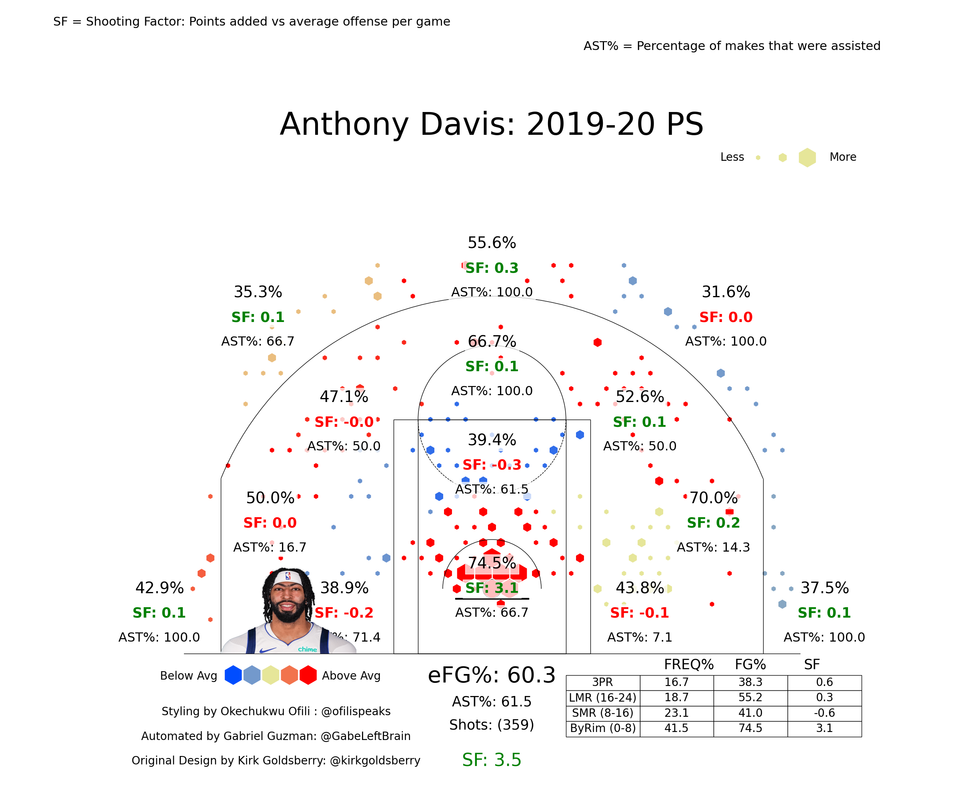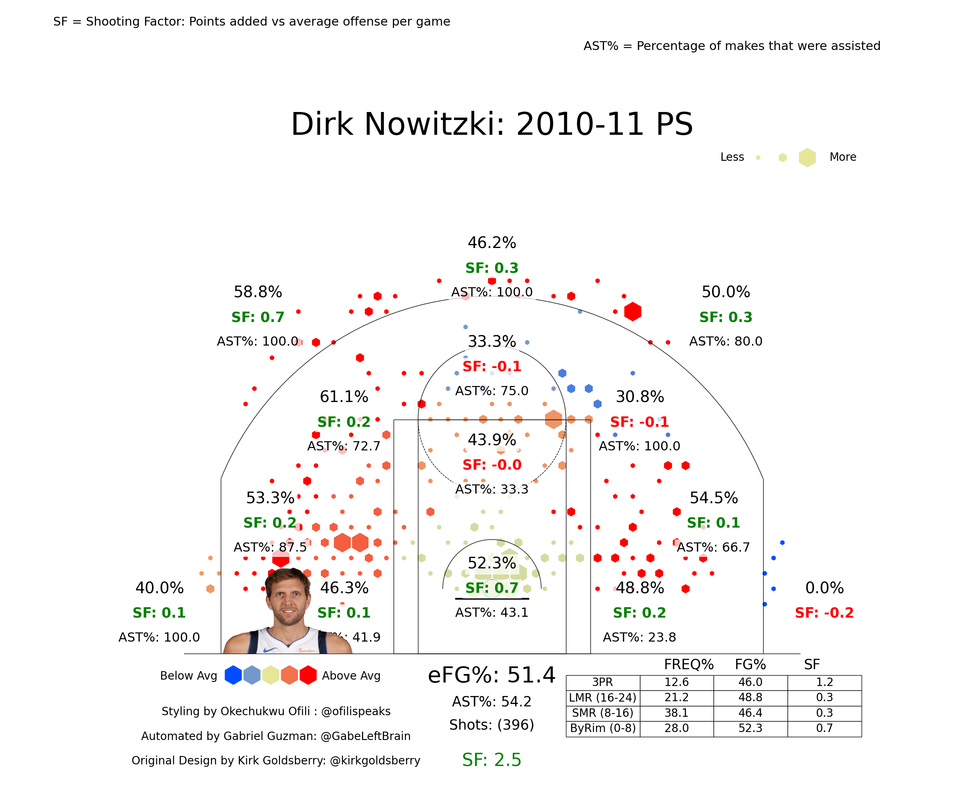I'm a nonvoter but I hope to participate in these projects in the future. I love reading the discussion and learning more, and it really broadens my perspective.
I'd like to share my two thoughts on the Chris Paul peak:
lessthanjake wrote:Special_Puppy wrote:For those who don’t have him top 2 on your ballot yet, I’m kinda curious what is keeping you from more seriously considering Chris Paul for these spots. Absolute monster box score numbers in the regular and post-season. Monster impact numbers (5th all time in career RAPM).
Honestly, for me it’s really hard to choose a year where someone went out in the first or second round—which is like every one of his best years (except 2018 if we think that’s a candidate for one of his best years). There’s just not a lot there in years like that for me to evaluate postseason quality, nor is there the team achievement that I think is a significant component of “greatness.”
There’s also just not a lot of his years without really serious negatives. I categorically won’t vote for years with playoff-ending injuries, which eliminates 2016 and maybe 2018. He has a couple other prime years where he was genuinely bad in the playoffs (2009 and 2012), so those years are basically out. And then there’s some issues that aren’t dealbreakers, but are serious negatives, including missing time in the playoffs without a playoff-ending injury (2015), and missing a lot of regular season games (2010, 2014, 2017, and 2018).
The only prime years that didn’t get mentioned above are 2008, 2011, and 2013. His teams didn’t even make the second round in 2011 and 2013, (and were beaten in the first round by teams that went on to get swept), and I’m just not a big fan of first-round-exit years when it comes to ranking the very greatest peaks, especially when the guy didn’t go supernova in the series his team lost (which Chris Paul didn’t quite do either year—though he was quite good in the 2011 first-round loss).
So there’s just serious negatives for virtually every year of his prime. I think the year I’d choose for him is 2008. I imagine I’ll eventually bite on that year in the next few threads. He had a genuinely great regular season, leading a team that wasn’t overly talented to a very good record. His team did lose in the second-round, but he played great in those two rounds, and it was against very good opponents in both rounds. When they lost, it was only in 7 games to a way more talented team. That year was the most impressed I was by CP3 in real time, and I think it’s what I’d choose for him. But I can’t quite take it over years where guys had really good seasons and then led their team to a title while playing well in the playoffs.
It's worth mentioning that the quality of first round and second round series is different.
The Clippers beat the defending champion Spurs in the first round in 2015 with a truly heroic ending.
That series alone makes the 2015 Clippers (as a team) better than many teams that make the Conference finals in other years, particularly in the East. Even some teams that made the finals (*cough* 2018 Cavaliers *cough*).
The quality of the Spurs vs. Clippers series was good enough to have been a conference finals series. Perhaps not in thay year, but in plenty of other years it would have been. Two teams in the +6.5 SRS range met up in the first round. That whole series prompted the NBA to change their system.
On top of this, Chris Paul was all in all a better player in 2015 than he was in 2008. He likely wasn't as good as he would have been without the injuries he suffered that lessened his athleticism, but his defense and shooting were markedly improved and were hyper-polished to an extreme extent, and that continued into the playoffs. If we're looking at an impact metrics perspective, the 2008 peak was way below the 2015 peak (largely on the defensive end, where CP3 was having one of the greatest defensive guard peaks of all time and was the paragon of two-way excellence). As for shooting it's easy to see the improvement in the stat sheet, and if you want to be really surprised, check out the way he ended that 2015 season. He really was on a tear. That same shooting was really important in knocking out the Spurs and I don't think a 2008 Chris Paul is doing that (he had the opportunity, but if you look at his shooting splits and complete lack of shooting volume it's bad. He just wasnt good enough yet).
On top of this, the 2008 Hornets team also could be said to have choked. It wasn't as heartbreaking or fluky, but the Hornets lost their 2-0 lead, which then was a 3-2 lead to the Spurs, who were a team of similar strength. Then that Spurs team went on to get dropped off in 5 by the Lakers. It's also not like Chris Paul didn't have help. He had the marvelous David West, Peja Stojakovic, and Tyson Chandler by his side, and all of these three (especially David West) were really, really good players. These weren't scrubs.
It might even be said that Chris Paul played better and was overall a better player in the 2015 playoffs than he was in the 2008 playoffs, and that's with the added injury dampening him somewhat. The fact that it's even comparable, to me, combined with the added context we know about how good the 2015 Spurs were, shows me that Chris Paul's peak was in 2015. And it was a very high peak indeed, definitely worthy of consideration in the top 10.
Furthermore, when we're considering surrounding seasons, Chris Paul was consistently excellent on the 2014 regular season, 2014 playoffs (aside from the choke at the end he had an amazing series against the Thunder), the 2016 regular season, and the 2016 playoffs (before he broke his hand). The surrounding years definitely should count for something, especially when compared to the inconsistency of the surrounding years of the 2008 peak, including one of the worst breakdowns any team could have in the playoffs in 2009. It's not all on Chris Paul, but still, I'm more impressed with the 2014 version.
If I'm putting my two cents in, at the end I'd probably put Kobe, SGA, and Kawhi (who has similarly has discordant playoffs and regular season peaks) before Chris Paul in some order (haven't thought about it a whole lot and I could be convinced any way), but I'd have Chris Paul #12 (and he's definitely comparable or has an argument to be better than peak Kawhi or peak SGA if we're talking about one-season peaks). Dirk also has an argument to be with Chris Paul. And I see Nash, Harden, and Durant as having peaks below him. Harden and Durant when they were the 1 option also had a few notorious choking seasons in some of their peak years, so that's not unique to Paul (what is unique to Paul is how many injuries he had).
And Nash's defense was so bad, I'd take Jason Kidd's peak (another underrated legend who arguably could even be in the Chris Paul tier) over his. He has a good argument but I'm unconvinced as of now. I only really mentioned him since he seems to be gaining popularity. Really I'd have him around 17 or something. I don't think he should be all the way up here.
All in all though, Chris Paul belongs in the top 13 somewhere, and I'd prefer the 2015 peak to the 2008 peak.














